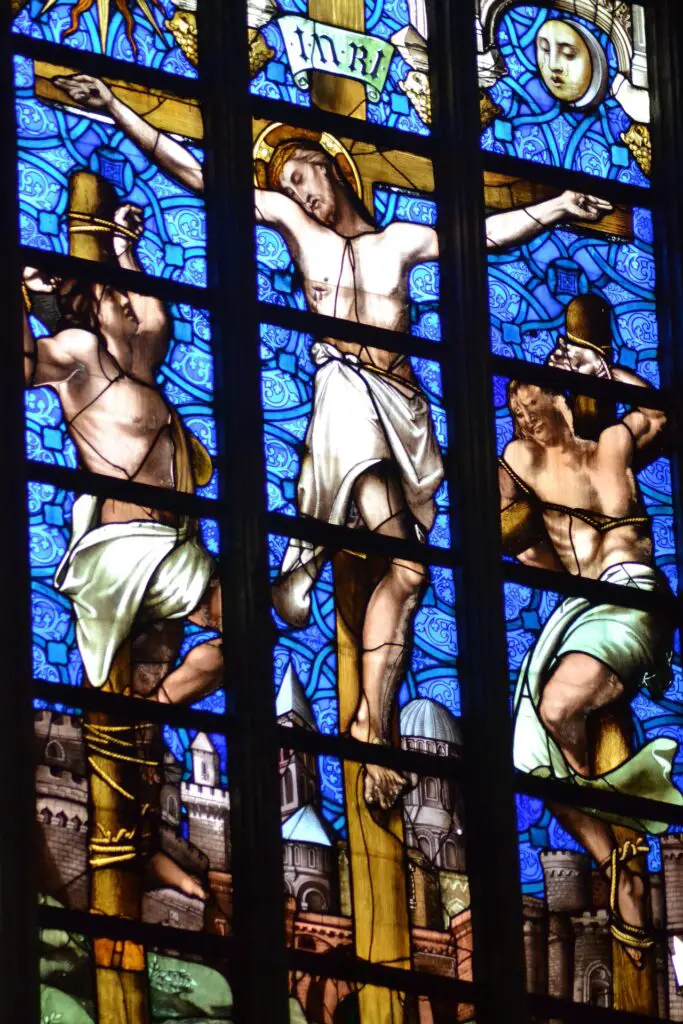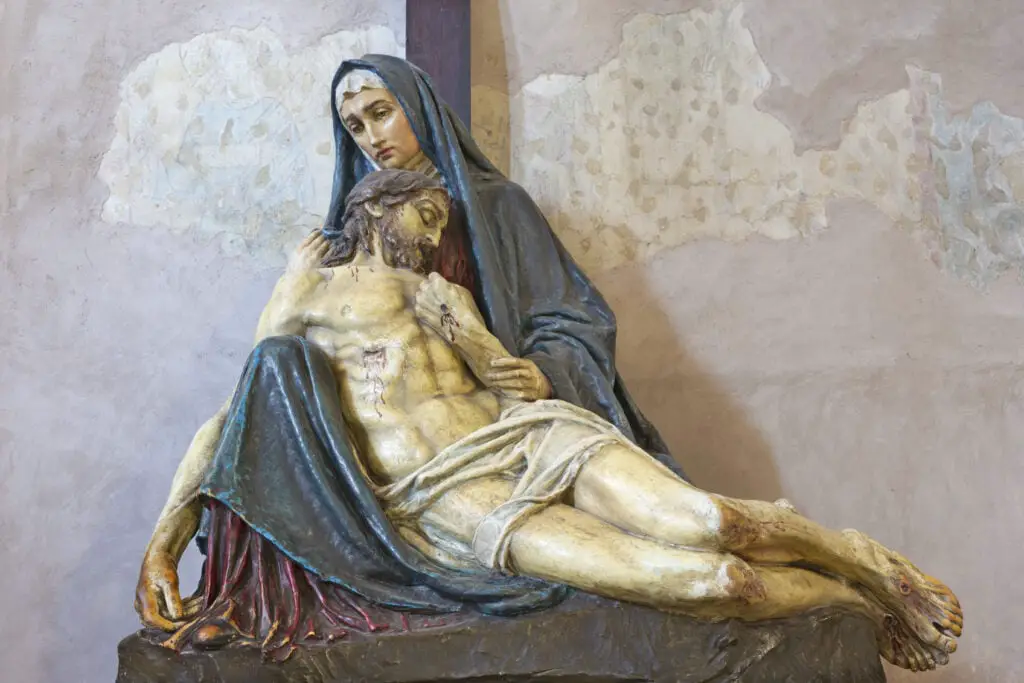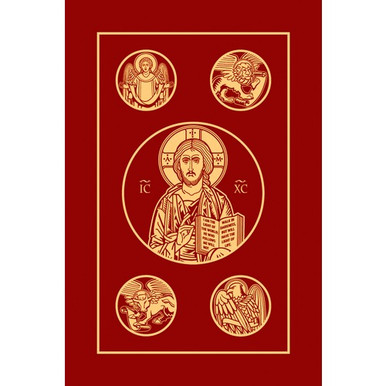This post contains affiliate links.
The branch of theology that attempts to explain the existence of suffering and evil in defense of a loving God is Theodicy. The proper place and purpose of suffering is not fully realized until the life, death, resurrection, Ascension and second coming of Jesus Christ is connected.
The Bible gives several reasons for suffering, including the our fallen nature through Original Sin; generational sins; human atrocities towards each other and towards God, for example idol worship; amongst others. Grappling with an understanding of suffering is seen in the many lamentations of the Prophets and writers of the Old Testament. The coming of Jesus, through his life, passion, death, and resurrection provides a clearer understanding of the purpose of suffering.
Suffering may seem burdensome, unnecessary, cruel, and misunderstood. This perception of suffering to those going through it, along with their family and friends is understandable. Who would want to see anyone suffer? Unfortunately, suffering is part of what it means to be human, and part of our fallen nature. However, whilst suffering can be excruciating to those who experience suffering, the burden is lightened when applied to that of Jesus Christ or given some purpose or a positive outcome. It is therefore fitting that we should attempt to make sense of suffering and how we should apply the suffering. In his book “Man’s Search For Meaning”, Viktor Frankl (link here) reminds us that it is not what happens to you that matters, but how you choose to respond to it. Viktor Frankl was a Jewish Psychiatrist, Philosopher, Writer and Holocaust survivor, who was offered the opportunity to leave during the annexation of Austria by the Nazis, however he declined and stayed with his parents. He was later taken to several concentration camps including Auschwitz-Birkenau, Kaufering and later Tuerkheim Dachau in Bavaria.
Frankl lost his family during the holocaust and survived the concentration camps. He attributes his survival to always appearing healthy and never succumbing to the atrocious conditions that many found themselves under. He goes on to say that we can choose our responses. The lesson taken from Viktor Frankl’s experience is that when faced with the terrifying news of a terminal illness, one can choose their response(s). The person faced with such horrific news may go through many emotions and many questions arise including:
- Does one just give up and succumb to the illness?
- Does one find a possible cure?
- Does one see the beauty of life and make the most of their living days with family and friends?
- Does one connect their suffering or illness with that of Jesus Christ?
The point of this article is to show that suffering has a purpose, a use and a benefit. Even without a belief in Jesus, a person can find purpose in their suffering. Suffering may bring families and friends closer, suffering may move the person to an enriching life, suffering may even bring the person closer to God, and suffering may help the person prepare for their final days.
Whilst suffering may have positive outcomes, these questions remain unanswered:
- Why do people suffer?
- Does suffering have a purpose?
- What is God’s purpose for suffering?
- Where is God when you are suffering?
- What is God’s answer to suffering?
- If God exists and God loves us, why do we suffer?
- What are some examples of suffering?
- How can I give my suffering purpose?
Recommended Catholic Bibles, Catholic Resource Website and Outstanding Catholic Research Software:
Why do people suffer?
The longer one lives, the greater the likelihood of suffering, however many younger people go through much suffering at an early age. How often do we known or hear of a child struggling with cancer or other ailments. Suffering, sadly is part of what it means to be a human being. It comes with the territory. One explanation can be attributed to the Fall of our first parents – Adam and Eve. The world was intended to be a good place as we read in Genesis that after God created on each day, He blessed His creation and called it good (see Genesis Chapter 1). There are no imperfections in God’s creation.
The warning God gave Adam and Eve following their special creation in God’s image and likeness was not to eat of the tree of the knowledge of good and evil:
“The Lord God took the man and put him in the garden of Eden to till it and keep it. And the Lord God commanded the man, saying, “You may freely eat of every tree of the garden;but of the tree of the knowledge of good and evil you shall not eat, for in the day that you eat of it you shall die.” (Genesis 2: 15-17).
The command is clear – eat of the forbidden tree and there are consequences. However, God gives His creation free will and the disobedience by Adam and Eve brought forward sin, and the many consequences of sin. Reflect on the following dialogue between the Serpent (Lucifer) and the Woman:
“Now the serpent was more subtle than any other wild creature that the LORD God had made. He said to the woman,
“Did God say, ‘You shall not eat of any tree of the garden’?”
And the woman said to the serpent,
“We may eat of the fruit of the trees of the garden; but God said, ‘You shall not eat of the fruit of the tree which is in the midst of the garden, neither shall you touch it, lest you die.’ ”
But the serpent said to the woman,
“You will not die. For God knows that when you eat of it your eyes will be opened, and you will be like God, knowing good and evil.”
So when the woman saw that the tree was good for food, and that it was a delight to the eyes, and that the tree was to be desired to make one wise, she took of its fruit and ate; and she also gave some to her husband, and he ate.

Then the eyes of both were opened, and they knew that they were naked; and they sewed fig leaves together and made themselves aprons. (Genesis 3: 1-7).
Adam and Eve had committed the sin of pride, “… and you will be like God, knowing good and evil”, and the sin of disobedience. There eyes were opened, and they hid from God. God knew what they had done, and upon finding them hiding in the garden questioned them:
“… the LORD God called to the man, and said to him,
“Where are you?”
And he said,
“I heard the sound of you in the garden, and I was afraid, because I was naked; and I hid myself.”
He said,
“Who told you that you were naked? Have you eaten of the tree of which I commanded you not to eat?”
The man said, “The woman whom you gave to be with me, she gave me fruit of the tree, and I ate.”
Then the LORD God said to the woman,
“What is this that you have done?”
The woman said,
“The serpent beguiled me, and I ate.” (Genesis 3: 9-14)
You can read the blame game – Adam says to God “the woman you gave to be with me…”. Adam blamed both God and the woman. The woman in turn blames the Serpent. However, God would not be mocked and hands out His justice to the Man, Woman and the Serpent. Offending an infinite God has infinite consequences. One can then see as to how sin and its’ consequences entered the world. The following is the dialogue from Genesis 3. Note the remedy.
“And the Lord God said to the serpent:
“Because thou hast done this thing, thou art cursed among all cattle, and beasts of the earth: upon thy breast shalt thou go, and earth shalt thou eat all the days of thy life. I will put enmities between thee and the woman, and thy seed and her seed: she shall crush thy head, and thou shalt lie in wait for her heel.”
To the woman also he said:
“I will multiply thy sorrows, and thy conceptions: in sorrow shalt thou bring forth children, and thou shalt be under thy husband’s power, and he shall have dominion over thee.”
And to Adam he said:
“Because thou hast hearkened to the voice of thy wife, and hast eaten of the tree, whereof I commanded thee, that thou shouldst not eat, cursed is the earth in thy work: with labour and toil shalt thou eat thereof all the days of thy life.
Thorns and thistles shall it bring forth to thee, and thou shalt eat the herbs of the earth. In the sweat of thy face shalt thou eat bread till thou return to the earth out of which thou wast taken: for dust thou art, and into dust thou shalt return.” (Genesis 3: 14-19).
“Then the Man and the Woman were cast out of the paradise of pleasure.” (Genesis 3: 20-24).
There is no distinction between humans from this passage, this just penalty affects every single person, nature, and creature. Creation is now subject to corruption, sin and suffering as a consequence.
This provides an explanation for as to why we suffer, and that suffering was never in God’s plan. Creation wasn’t originally created to die but now creation is subject to death, and to die, one’s body can no longer house the soul, in that it becomes ill, frail or damaged.
If you read the passage from Genesis 3:15 carefully, you will see that God has a remedy – a Woman and Her Seed (or Offspring). The Woman is Mary and Her See is Jesus. For Jesus will make sense of our suffering and restore what was lost by our first parents.
The next series of questions place suffering in a Catholic and Christian understanding. God is never too far away from anyone’s suffering, and like Viktor Frankl, it is how we choose to respond that gives suffering a new meaning in Jesus Christ.
Where is God when you are suffering? What is God’s answer to suffering? If God exists and God loves us, why do we suffer?
The above questions are answered as one as they pertain to asking about the role of God in suffering. Believing in the existence of God, can be a hindrance to those who cannot understand, how a loving God can allow suffering and evil in the world?
A good example to start with is that of Job. The Book of Job presents an understanding of suffering that places God in the picture, in that God, through His permissive will, allows Satan to test Job in all areas of life – from losing his family, to losing his possessions, and to his own bodily disfigurement. God places all his confidence in Job – a faithful and righteous man.
Despite the many sufferings, Job responds with the perfect faithfulness to God,
“Then Job arose, and tore his robe, and shaved his head, and fell upon the ground, and worshiped. And he said,
“Naked I came from my mother’s womb, and naked shall I return; the LORD gave, and the LORD has taken away; blessed be the name of the LORD.”
In all this Job did not sin or charge God with wrong.” (Job 1: 20-22).
Job is a model of misfortune and suffering that can strike any of us in our life. Once again, remembering that God is there seeing us through it. Through Job’s faithfulness throughout his ordeal, God began to shower upon him good fortune.
Here we see that our suffering will be rewarded, and this is a typology of the afterlife – where all our suffering and misfortune will be no more, so long as we can show God faithfulness. For our predicament is not the result of God’s deliberate intent, but part of our human nature, for which God allows in His permissive will. Should God send us such misfortune, we must choose our response, and this will have eternal benefit.
Pope St John Paul II once remarked to a complaining Priest, who presented with an illness,
“Do not waste your suffering!”
What does that mean ‘not to waste your suffering’? Whilst suffering entered the world through the First Sin of Adam and Eve at the Fall, the suffering of Jesus gives suffering redemptive meaning, for Jesus came for all and to undo what Adam and Eve had done. Further, the many heroic men and women, the Catholic Church recognizes as saints, were willing to accept sufferings for the purpose of bringing back to God’s Grace the lost and those in sin. For these the hope of salvation would be at a loss if not for these saints.
Suffering is a mystery beyond our full understanding but when placed in the context of the redemptive suffering of Jesus, it begins to make sense and has it purpose. Going back to the words of Pope St John Paul II, “Don’t waste your suffering”, suffering has a purpose and explains the existence of suffering and does not in any way diminish the existence of God.
The adage, good things happen to bad people; and bad things happen to good people; makes sense and the many questions that are associated with the purpose of suffering can be alleviated.

The suffering and death of Jesus thus came to be viewed as part of God’s design: It was for a greater good, and the salvation of humanity. Christ died for others, and, by example, the followers of Jesus should be willing to take up their own crosses, deny themselves and follow Him (St Matthew 16:24; St Luke 9: 23; St Mark 8:34).
Jesus was an innocent man and had no reason to be Crucified like a criminal. Jesus’ suffering and death on the Cross was for all humanity. Our suffering should be united with that of Jesus and applied for the salvation of others. The Good Thief expresses Jesus’ innocence on the Cross as he rebukes the other criminal:
“One of the criminals who were hanged railed at him, saying,
“Are you not the Christ? Save yourself and us!”
But the other rebuked him, saying,
“Do you not fear God, since you are under the same sentence of condemnation? And we indeed justly; for we are receiving the due reward of our deeds; but this man has done nothing wrong.” (St Luke 23: 39-41).
What does the New Testament teach about Suffering?
St Paul is very vocal on suffering and here are a few that illustrate the purpose and understanding of suffering. I have highlighted aspects of each quote that specifically mentions suffering:
“Therefore, since we are justified by faith, we have peace with God through our Lord Jesus Christ. Through him we have obtained access to this grace in which we stand, and we rejoice in our hope of sharing the glory of God.
More than that, we rejoice in our sufferings, knowing that suffering produces endurance, and endurance produces character, and character produces hope, and hope does not disappoint us, because God’s love has been poured into our hearts through the Holy Spirit who has been given to us.” (Romans 5: 1-5)
And further,
“So then, brethren, we are debtors, not to the flesh, to live according to the flesh – for if you live according to the flesh you will die, but if by the Spirit you put to death the deeds of the body you will live. For all who are led by the Spirit of God are sons of God.
For you did not receive the spirit of slavery to fall back into fear, but you have received the spirit of sonship. When we cry,
“Abba! Father!”
it is the Spirit himself bearing witness with our spirit that we are children of God, and if children, then heirs, heirs of God and fellow heirs with Christ, provided –we suffer with him in order that we may also be glorified with him.” (Romans 8: 12-17).
This passages shows that God comforts us in our affliction and that we are to do the same towards others.
“Blessed be the God and Father of our Lord Jesus Christ, the Father of mercies and God of all comfort, who comforts us in all our affliction, so that we may be able to comfort those who are in any affliction, with the comfort with which we ourselves are comforted by God.
For as we share abundantly in Christ’s sufferings, so through Christ we share abundantly in comfort too.
If we are afflicted, it is for your comfort and salvation; and if we are comforted, it is for your comfort, which you experience when you patiently endure the same sufferings that we suffer. Our hope for you is unshaken; for we know that as you share in our sufferings, you will also share in our comfort.” (2 Corinthians 1: 3-7).
A final quote, amongst many, gives hope to those who are afflicted and reminds us that God wills everything and that the power comes from God. There is a mysterious purpose to suffering, a reward that awaits and that we should never be perplexed, despair, not destroyed and not to lose heart:
“But we have this treasure in earthen vessels, to show that the transcendent power belongs to God and not to us. We are afflicted in every way, but not crushed; perplexed, but not driven to despair; persecuted, but not forsaken; struck down, but not destroyed; always carrying in the body the death of Jesus, so that the life of Jesus may also be manifested in our bodies.
For while we live we are always being given up to death for Jesus’ sake, so that the life of Jesus may be manifested in our mortal flesh.
So death is at work in us, but life in you. Since we have the same spirit of faith as he had who wrote, “I believed, and so I spoke,” we too believe, and so we speak, knowing that he who raised the Lord Jesus will raise us also with Jesus and bring us with you into his presence.

For it is all for your sake, so that as grace extends to more and more people it may increase thanksgiving, to the glory of God.
So we do not lose heart. Though our outer man is wasting away, our inner man is being renewed every day. For this slight momentary affliction is preparing for us an eternal weight of glory beyond all comparison, because we look not to the things that are seen but to the things that are unseen; for the things that are seen are transient, but the things that are unseen are eternal.”
(2 Corinthians 4: 7-18). St Paul brings home the reality of suffering in that in can dispirit many, but he gives hope and perseverance to all. The reward is the afterlife, as Jesus was raised, so shall the afflicted.
What are some examples of suffering?
Suffering can take many forms. Suffering can be physical, psychological, mental, spiritual, financial, sociological, familial, and more.
Suffering can range in severity from mild to excruciating. We often complain about the smallest discomfort for example I have a flat tire, or I have a mild- flu, yet I complain and curse God and others as a result. Is this the response that God wants? There are many who experience severe suffering such as terminal cancer, yet their countenance is one of acceptance, peacefulness and joy. Why? Because they see this as meritorious and purposeful. They see their suffering as temporary and an opportunity to prepare to face their creator. They also see their suffering as purposeful, which is the next section: How can I give my suffering purpose?
How can I give my suffering purpose?
I want to open by giving the example of the Children of Our Lady of Fatima – St Jacinta, St Francisco and Sister Lucia. The first question the Mother of God, Our Lady asked, “Do you wish to suffer for sinners?” To which the children responded, “Yes”. Then Our Lady said, “Then you will have much to suffer.”
In saying this, Our Lady also promised Her assistance throughout their suffering.
The Children would often seek means of suffering such as going without food, eating food that they don’t usually enjoy, wearing a rough rope around their waste as a means of mortification, and more. They would offer these afflictions to sinners – those who have created a chasm between themselves and God and without repentance, they are unable to assist themselves. The Children offered these afflictions to the repentance of these sinners. In fact, both St Jacinta and St Francisco, who died during the Spanish Flu, underwent much suffering.
Suffering, as mentioned earlier, can take many forms and we should never waste our suffering. Every discomfort, affliction and suffering has a purpose and will be the difference between saving a loved one’s soul or damnation.
What I usually do is should I accidentally bump a finger or my leg, with pain eventuating, I would endeavor to offer the pain to a person in need, rather than curse and feel sorry for myself. You can do the same – is it easy? No, it sure isn’t, but Jesus underwent every possible suffering and died for every sin that we can possibly commit. Then we can unite our suffering with that of Jesus’ suffering. Jesus offered the perfect offering, and we can not add anything more, but we can unite and cooperate with His suffering.
Suffering is eternally beneficial for you and others. God has a plan, even when we cannot see it.
God be with you.



